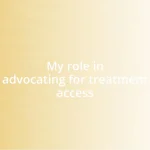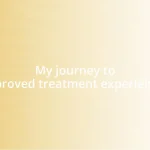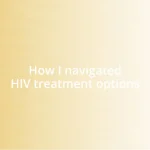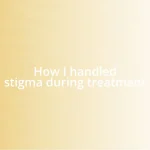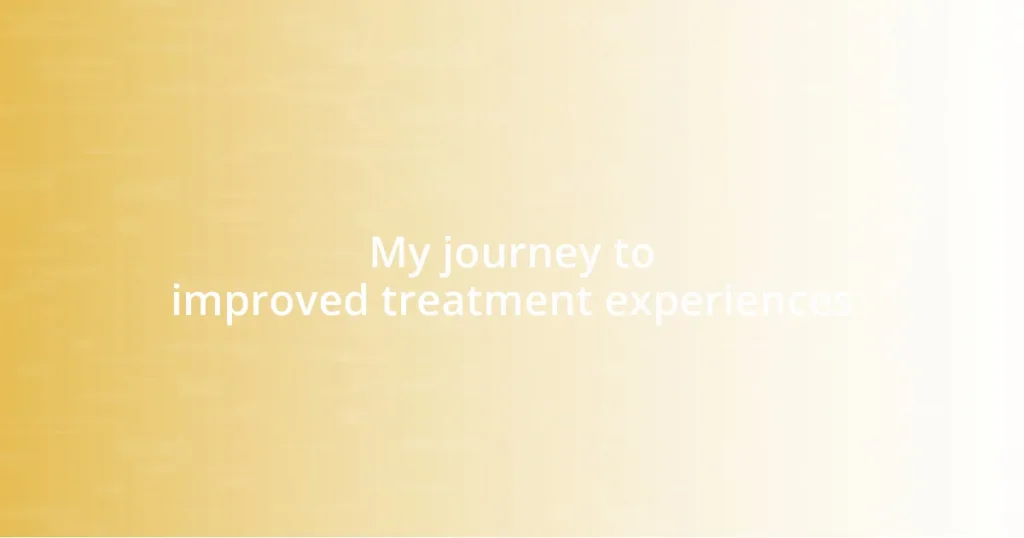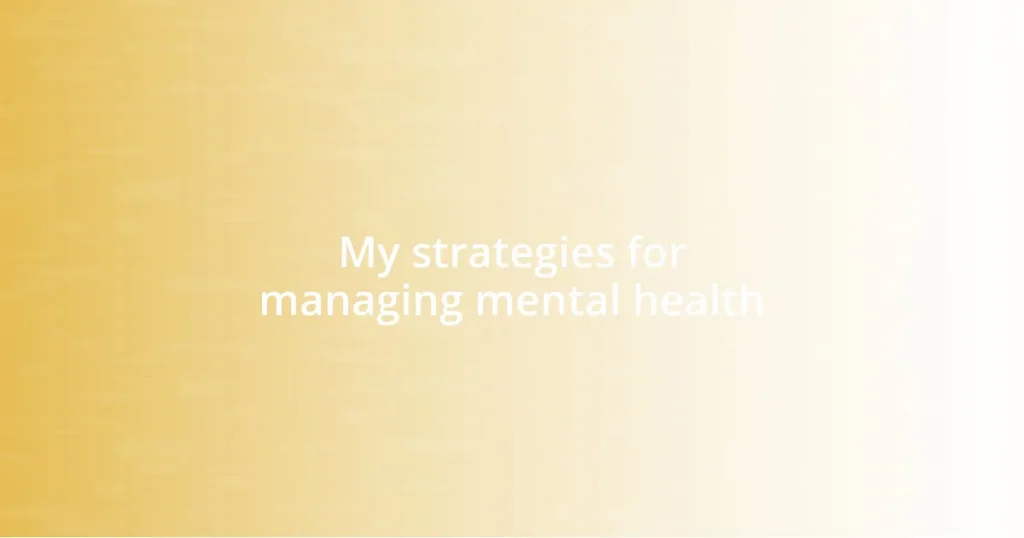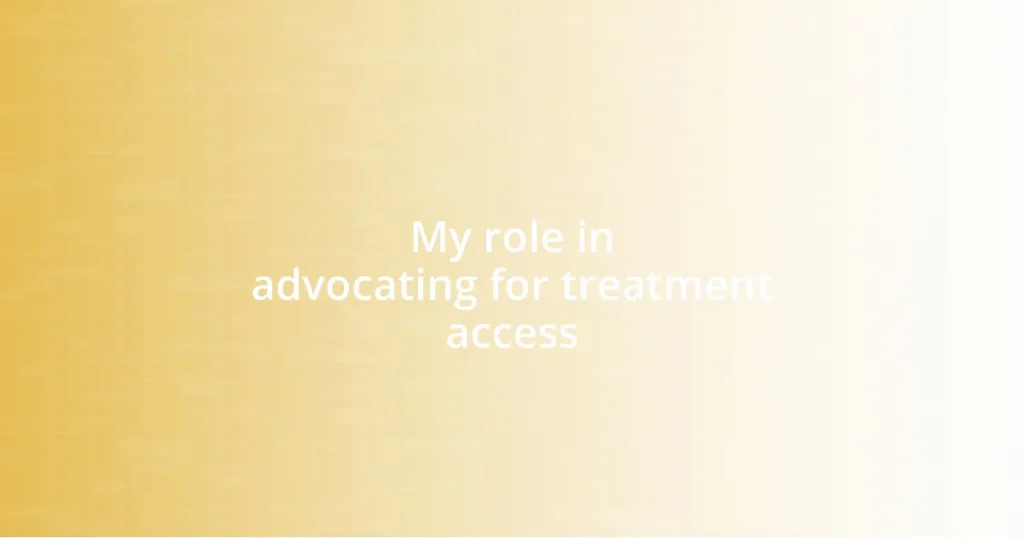Key takeaways:
- Recognizing the emotional aspects of treatment experiences is essential for growth and resilience.
- Effective communication with healthcare providers enhances understanding and promotes collaboration.
- Utilizing patient advocacy resources can empower patients and create a supportive network.
- Celebrating small victories in the treatment journey fosters motivation and strengthens relationships with providers.
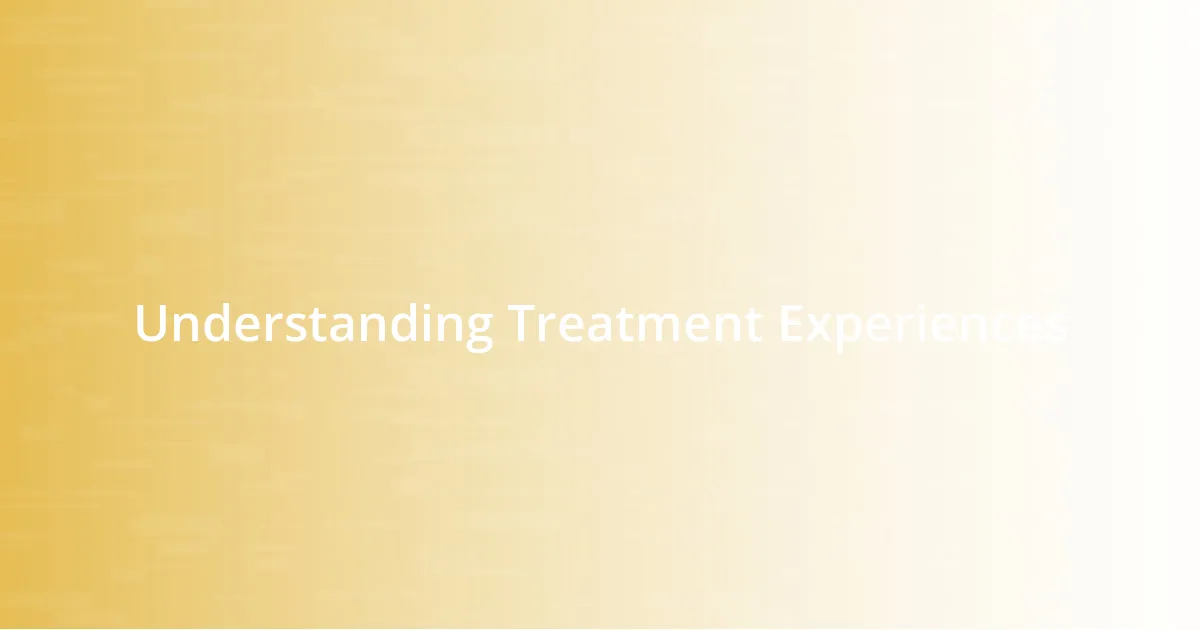
Understanding Treatment Experiences
Understanding treatment experiences involves more than just the medical procedures; it’s about how those experiences resonate emotionally and psychologically. I remember a time when I was sitting in a sterile waiting room, filled with anxiety, wondering how the treatment would impact my life. Have you ever felt that mixture of hope and fear? It’s a uniquely vulnerable space, isn’t it?
As I navigated through different treatments, I began to realize that every journey is as unique as the individual undergoing it. I often reflected on how our perspectives shape our experiences—embracing the moments of camaraderie with other patients transformed my outlook. How often do we underestimate the power of shared experiences to bolster our resolve?
I’ve learned that understanding treatment experiences also requires acknowledging the fear of the unknown. There were nights when doubt crept in, and I found myself wrestling with questions like, “Is this the right path for me?” What I discovered is that these encounters aren’t just about outcomes; they’re about growth, resilience, and the human connection that underpins every journey through treatment.
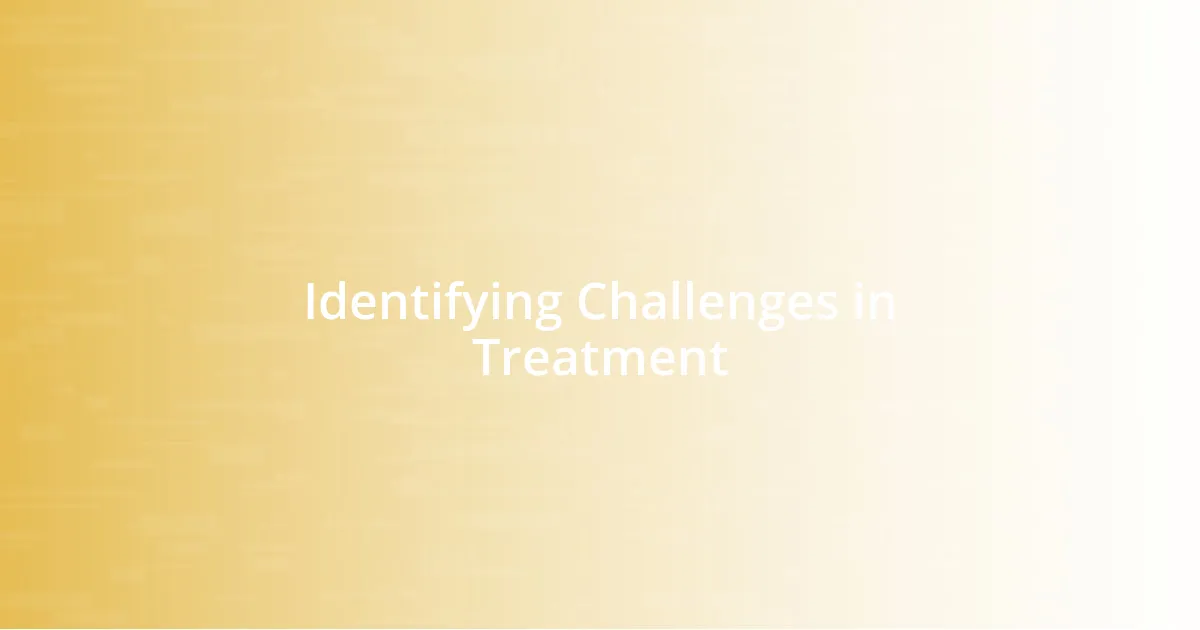
Identifying Challenges in Treatment
Identifying challenges in treatment often begins with recognizing the emotional hurdles that accompany the medical ones. I vividly recall a particularly tough appointment where the doctor delivered disappointing news. The crushing weight of that moment didn’t just affect my treatment plan; it sent ripples of doubt throughout every aspect of my life. It was a stark reminder that challenges are not solely clinical; they also reside in our fears, our hopes, and our ability to cope.
To pinpoint the challenges I faced, I found it helpful to create a list. Here’s what I identified as some significant obstacles:
- Communication Gaps: I often struggled to understand complex medical jargon, which left me feeling lost and frustrated.
- Emotional Turmoil: Moments of despair struck when treatment didn’t go as planned, leading to feelings of isolation.
- Access to Resources: Finding the right support, whether it was mental health resources or financial assistance, proved to be a daunting task.
- Balancing Life: The challenge of maintaining a sense of normalcy while undergoing treatment was often overwhelming.
These challenges shaped my perspective and made me realize that addressing them head-on was essential for my journey towards improved treatment experiences.
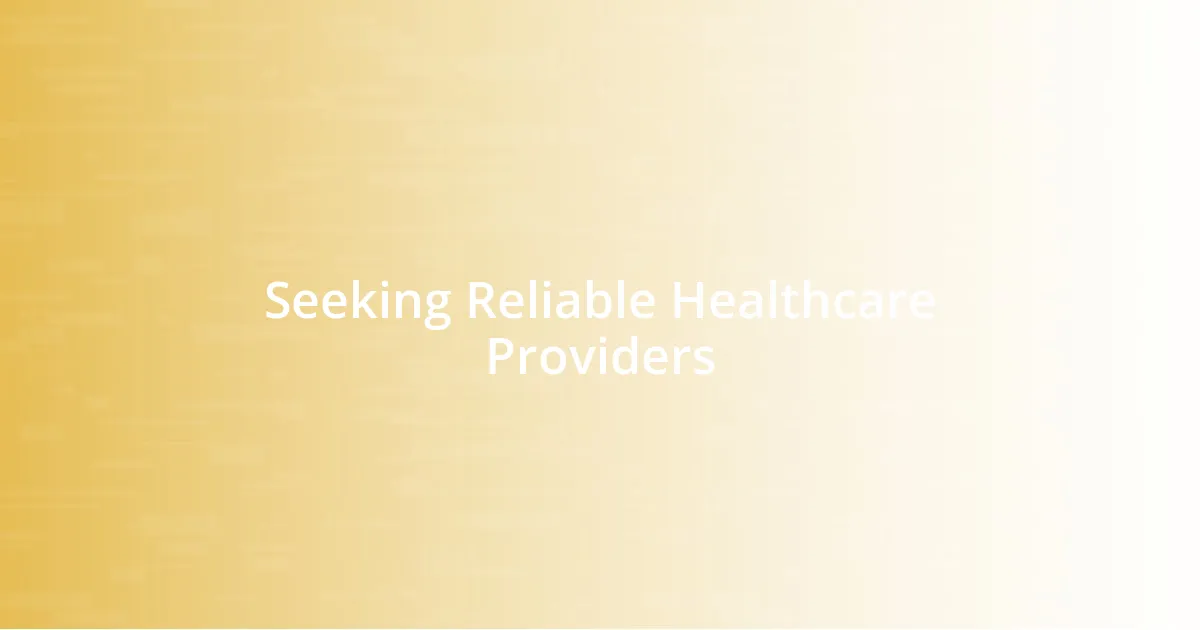
Seeking Reliable Healthcare Providers
Seeking reliable healthcare providers can feel like navigating a labyrinth. I remember scouring online reviews, trying to decipher which providers had the credibility I needed. It was like searching for a hidden treasure amidst a vast sea of information. Have you experienced that feeling of uncertainty when choosing a doctor or clinic? It’s so important to weigh the options carefully to avoid disappointment later on.
I’ve also discovered that talking to others can be incredibly revealing. A friend recommended a specialist who changed her life, and I felt an immediate sense of reassurance just hearing her story. Personal recommendations often provide insight that reviews or articles may lack. It’s fascinating to see how different experiences shape our perceptions of healthcare providers.
Furthermore, understanding the credentials and expertise of providers is crucial. For instance, many might categorize a doctor as “excellent” based solely on bedside manner, but I learned the hard way that credentials matter just as much. That’s why I began to research their backgrounds, read up on their specialties, and didn’t hesitate to ask about their experience. After all, ensuring that I was in knowledgeable hands made all the difference in my treatment journey.
| Criteria | Importance |
|---|---|
| Credentials | Essential for quality care |
| Personal Recommendations | Provides trustworthy insights |
| Patient Reviews | Helps gauge overall patient satisfaction |
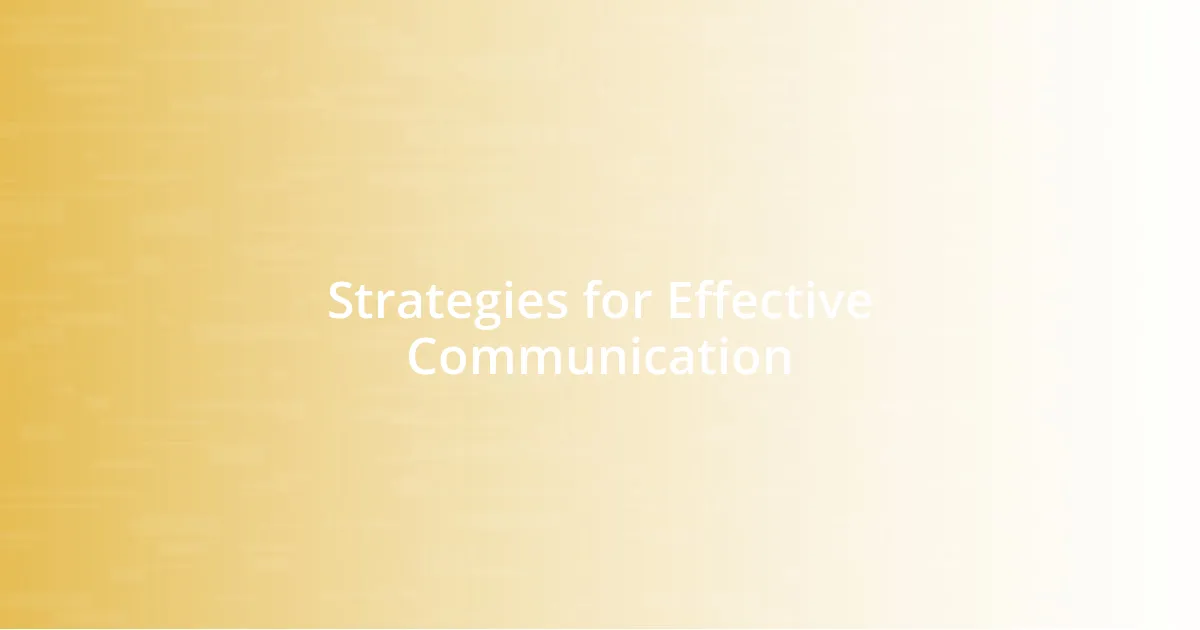
Strategies for Effective Communication
Effective communication can be a game-changer in any treatment journey. I remember a time when I felt frustrated after an appointment because I didn’t fully grasp the treatment plan. It was a simple phone call that made all the difference—I asked my healthcare provider to explain the details again. The clarity I gained transformed my apprehension into empowerment, allowing me to take charge of my treatment plan.
One strategy I found invaluable is practicing active listening. When I engaged fully during consultations, I developed a deeper understanding of my options. Instead of only thinking about my next question, I focused on absorbing what my doctor was saying. This approach not only helped me retain important information but also encouraged a more open dialogue. Have you ever tried repeating back what you’ve heard to confirm understanding? This technique can enhance the connection between you and your provider, creating an atmosphere of trust.
Another key element is not hesitating to express my feelings or concerns. I distinctly recall sharing my anxieties about side effects during a medication discussion. Opening up about my emotions led to a supportive conversation, where my doctor provided reassurance and alternative options. It reinforced my belief that vulnerability in communication fosters collaboration, making the entire treatment process smoother and more comforting.
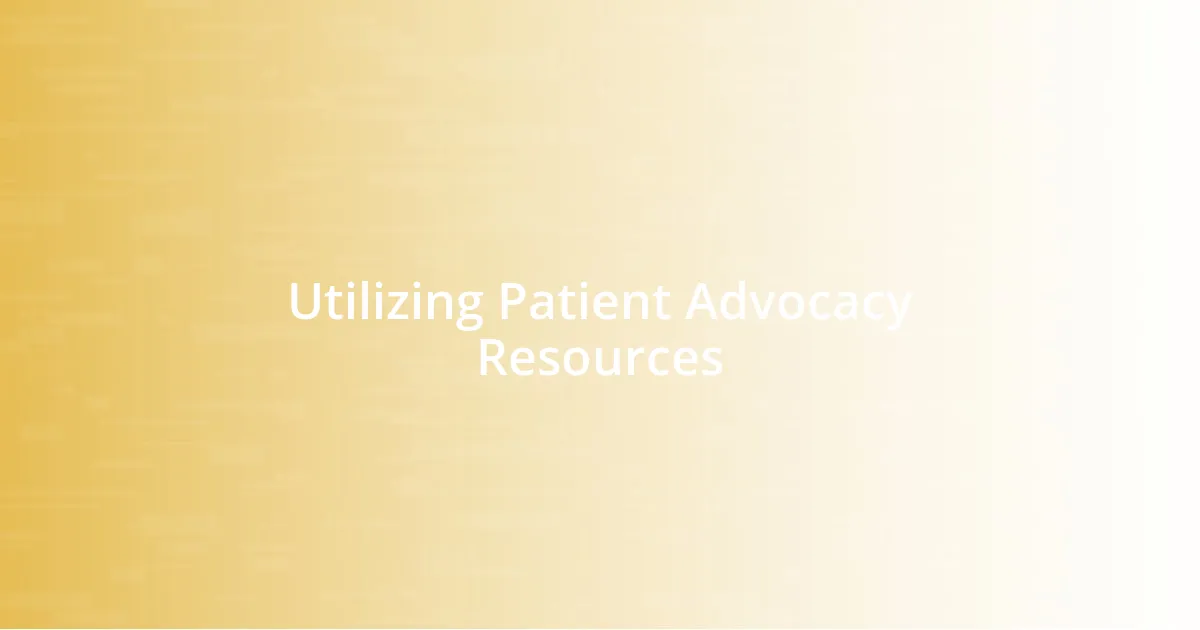
Utilizing Patient Advocacy Resources
Utilizing Patient Advocacy Resources
Navigating the healthcare system can be incredibly daunting, but patient advocacy resources can provide the guidance we need. I remember the first time I reached out to an advocacy organization; it felt like finding a lifeline. They helped me understand my rights and what questions I should be asking during appointments. Have you ever felt lost in a sea of medical jargon? Having an advocate by my side made the world of difference.
In my experience, these resources come with a wealth of knowledge about everything, from treatment options to complaint processes. I once attended a workshop organized by an advocacy group and learned how to prepare a list of essential questions for my next visit. It was empowering to walk into an office with a clear agenda instead of just passively listening to what was being said. It’s remarkable how taking an active role in our health care can foster confidence and clarity.
Moreover, connecting with other patients through these resources can create a strong support network. After joining a local support group, I was amazed by the stories shared and the encouragement exchanged. Realizing that others have faced similar challenges made my journey feel less isolating. Have you thought about how sharing experiences can lighten the emotional burden? Through these connections, I found not only hope but insightful tips that enriched my understanding and transformed my treatment experience.
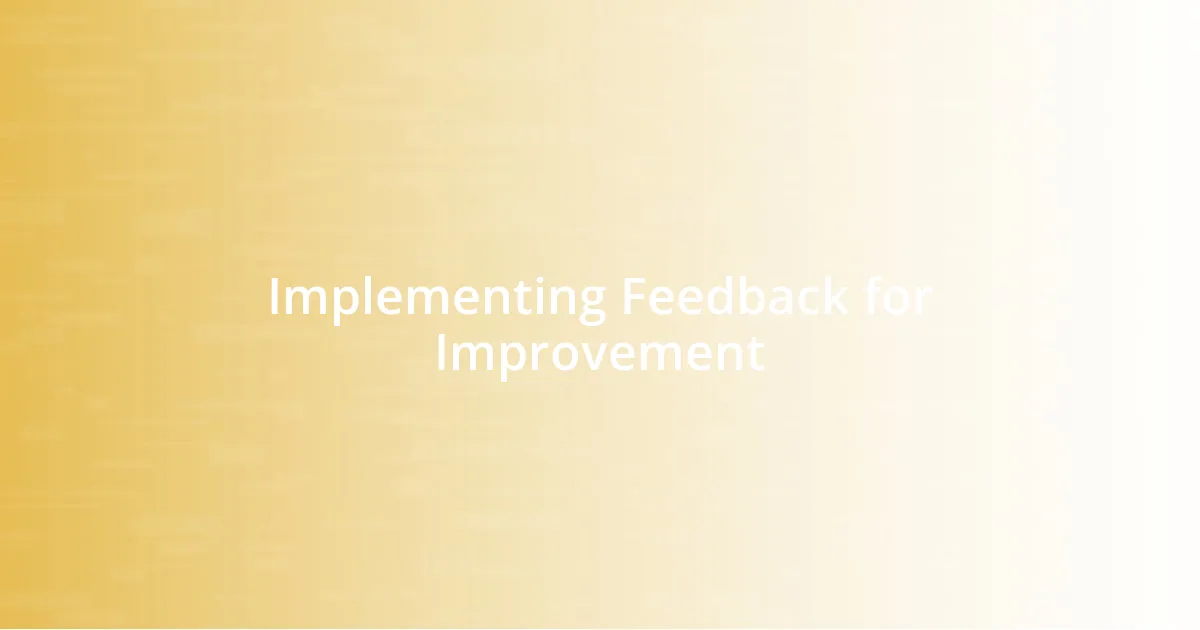
Implementing Feedback for Improvement
Implementing feedback is crucial for refining treatment experiences. I recall a time when, after voicing my discomfort with a particular medication, my doctor took my concerns seriously and adjusted my treatment plan. It’s empowering to see how such honest communication can lead to tangible changes that enhance our well-being. Have you ever felt that your feedback wasn’t valued? It’s vital to recognize that your voice matters in this journey.
In my exploration of healthcare interactions, I learned the significance of follow-up conversations. When I shared my thoughts about a recent appointment via a short email, my provider not only responded promptly but also used my feedback to enhance future consultations. This back-and-forth fostered a partnership that made me feel more involved in my care. It’s fascinating how a simple note can spark improvements, isn’t it?
I’ve noticed that creating an environment where both patients and providers feel safe to share feedback can transform the healthcare experience. I remember attending a feedback session organized by my clinic, where patients were encouraged to discuss their experiences openly. This well-structured dialogue led to actionable changes, like better scheduling practices and improved communication methods. Ultimately, seeing those adjustments in action filled me with hope, illustrating that our insights can genuinely contribute to refining treatment processes.
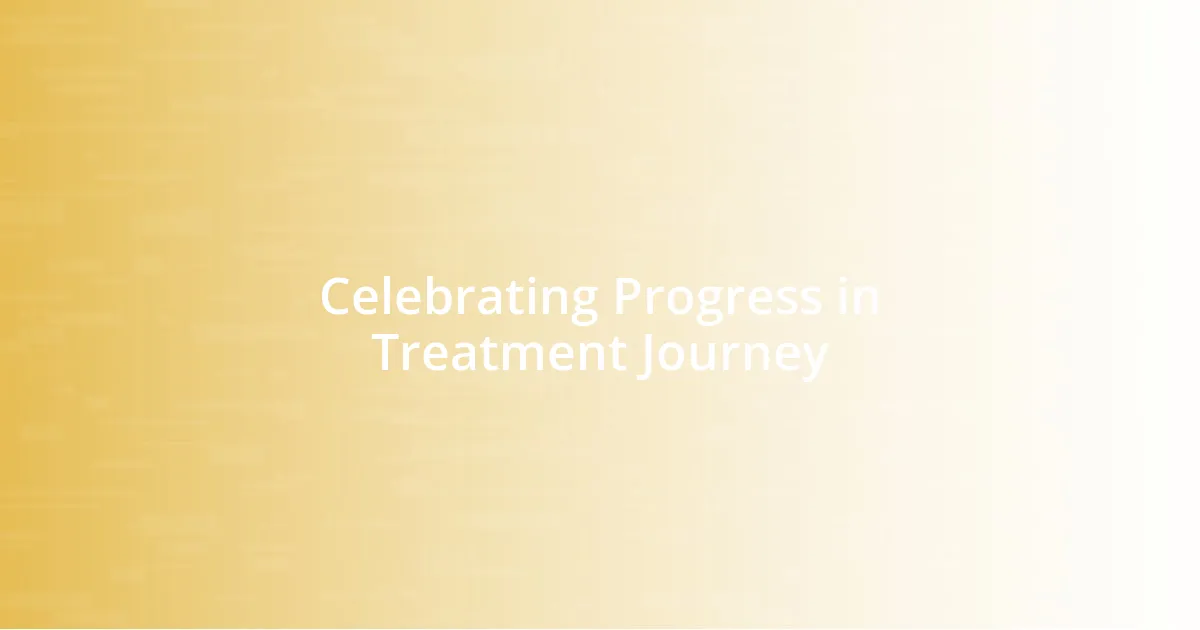
Celebrating Progress in Treatment Journey
Celebrating progress in our treatment journey is essential, for it reminds us of how far we’ve come. I distinctly remember the moment when I learned to monitor my symptoms and share that data with my healthcare team. In that experience, I felt a profound sense of empowerment—I hadn’t just become another patient; I was a proactive participant in my own health. Isn’t it incredible how small victories can shift our mindset and invigorate our journey?
Marking milestones, no matter how small, can be incredibly uplifting. The day I successfully completed a challenging component of my therapy, I felt like I was walking on air. I took the time to celebrate that moment with friends who understood the struggle. Have you considered how celebrating such achievements can reinforce our motivation? These shared celebrations cultivate a sense of community and create lasting memories that remind us of our resilience.
Of course, recognizing our progress isn’t just about personal accomplishments; it’s also about the growth in our relationships with healthcare providers. I recall how my conversations with my doctor evolved over time. Initially, I would shyly express my concerns, but gradually, I found my voice. When my doctor celebrated my willingness to engage in discussions about my treatment, it felt like a well-deserved pat on the back. Have you noticed how a simple acknowledgement from others can elevate your sense of progress? These connections foster a collaborative atmosphere, making the journey not only about the treatment but also about building trust and understanding along the way.


